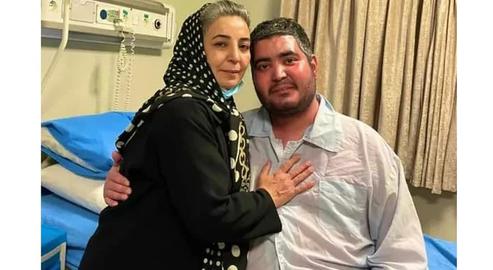This week, a photo was circulated showing Amir Hossein Moradi on temporary release from prison, embracing his mother in hospital. The image engendered all kinds of reactions – relief, well-wishes, anger at his plight – and amongst them, more than a few people noticed the young man’s significant weight gain.
Comparing photos of Moradi before and after his arrest, some Iranian social media users asked what the Islamic Republic does to prisoners to make them look like this. Pictures from late 2019 showed Amir Hossein standing tall, with a neat beard, thumbs up and a smiling face. In October 2021 his features looked not just swollen, but haunted.
Last year the 27-year-old’s case made international headlines when he was sentenced to death by the Revolutionary Court, along with Saeed Tamjidi and Mohammad Rajabi, in connection with attending the November 2019 protests. A global outcry prompted re-examination of their cases.
Mohammad Moradi, Amir Hossein’s father, committed suicide on September 28, 2020 in reaction to the death sentence. His son was not allowed out of prison to attend his funeral. Finally the First Branch of the Supreme Court overturned the three death sentences, and Moradi has now been released on posting bail of four billion tomans ($150,000) until the end of the trial.
Moradi suffers from a skin condition, psoriasis, which is an autoimmune disease exacerbated by stress and anxiety. His condition drastically worsened during his time in prison. Last month his lawyer, Babak Paknia, posted a horrific picture on Twitter of the young man’s scarred and scaly foot. In a direct address to Chief Justice of Iran Gholam Hossein Mohseni Ejei, he demanded to know: “You said today that if something happens to a prisoner during his detention, the judiciary is responsible! I wrote to you that his condition is serious... Your office didn’t pay attention! Who is responsible for my client's life?”
Born on August 6, 1994, Moradi has a degree in computer science and before his arrest sold mobile phones, computers and software in Tehran. His life has been turned upside down in the past two years, and according to a doctor in Tehran who spoke to IranWire, this could also explain why he has gained weight. “The arrest, imprisonment, death sentence and suicide of his father... Each one of these pressures could have inflicted a massive amount of stress on him, causing the disease to flare up.
"There is no definitive cure for this disease, but cortisone [a steroid hormone] is used to control it. It seems that Mr. Moradi has been injected with high-dose corticosteroids [an anti-inflammatory]; obesity can be a side effect. People who take corticosteroids are often described as having a ‘full moon face’; it can also affect the adrenal glands and cause many problems. That’s why any patient taking corticosteroids should be under close supervision of a doctor."
“Weight Gain Doesn’t Imply Happiness”
Amir Hossein Moradi is not the only person whose changed appearance before and after jail stunned observers. Human rights advocate Narges Mohammadi was released from prison in March 2021 and had noticeably gained weight. Pro-regime cyberspace users tried to ridicule her for it.
While in prison, Mohammadi had come down with Covid-19 and also suffered from muscle paralysis. She has also spoken about traumatic incidents that happened to her behind bars, including torture and long periods in solitary confinement. A psychiatrist based in Tehran told IranWire: “I don’t know exactly what Ms. Mohammadi's problem was, but if she used neuropsychiatric pills to treat her illness, increased appetite and inflammation are side effects of most of these drugs.
"The prison environment and interrogation are major causes of stress. As I understand it Ms. Mohammadi was barred from so much as meeting or talking on the phone to her children, and this increases the disquiet. Weight gain and obesity are generally read as signs of someone having fun and feeling happy, but we all know people who overeat in times of stress.
"I often say, a depressed person isn’t necessarily just someone who sleeps, never bounces back and is always sad. And a person who gets obese has not necessarily gained weight because of eating and being happy and resting. And if a person laughs constantly, it doesn’t mean that he has no sorrows."
Related coverage:
Activists Raise Alarm Over Prisoner Amir Hossein Moradi's Health
Iran Sentences Three Protesters to Death
Iranian Asylum Seekers in Turkey are Returned to Iran and Sentenced to Death
More than Four Million Twitter Users Say: Don’t Execute These Three Iranian Protesters!
Fresh Information Surfaces on the Nightmarish Trial of Three Young Protesters
Father of Jailed Protester Commits Suicide
A Father’s Suicide Leads to Outcry Against Capital Punishment in Iran
Narges Mohammadi Speaks on Clubhouse About Solitary Confinement, Sanctions and Torture
visit the accountability section
In this section of Iran Wire, you can contact the officials and launch your campaign for various problems


























comments